church elders pdf
Summary
Learn about the essential roles of church elders. Download our free PDF guide now.
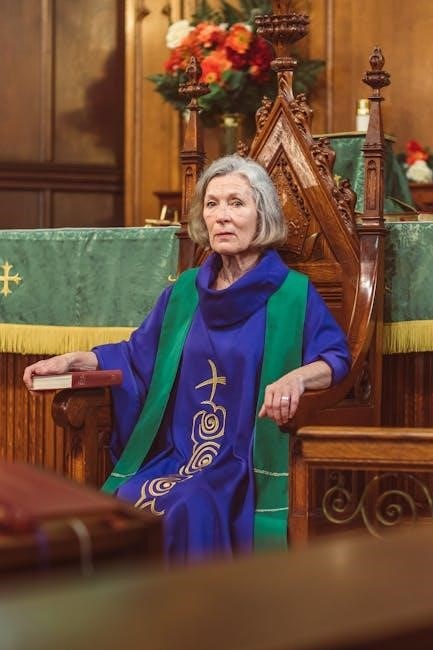
Church elders are spiritual shepherds and overseers, ensuring the church’s health through biblical leadership. They must meet specific qualifications and work collaboratively, as seen in Gateway Church’s model, balancing tradition with modern challenges effectively.
Overview of the Role of Elders in the Church
Elders serve as spiritual shepherds and overseers in the church, tasked with ensuring the spiritual well-being and unity of the congregation; Their primary responsibilities include teaching, guiding, and caring for the flock of God. Elders are responsible for shepherding the church, providing biblical guidance, and addressing spiritual needs. They work closely with pastors and other leaders to maintain order and promote discipleship. Elders also oversee church affairs, such as managing finances and resolving conflicts, allowing pastors to focus on preaching and teaching. In many churches, elders are expected to model Christ-like character and lead by example. Their role is both administrative and pastoral, ensuring the church remains aligned with biblical principles. Gateway Church and other modern churches highlight the importance of elders in maintaining unity and accountability within the congregation, demonstrating their vital role in church governance and spiritual growth.
Historical Context of Church Elders
The role of church elders is deeply rooted in biblical and historical traditions. In the Old Testament, leaders like Moses, Samuel, and the judges served as shepherds for God’s people. This pattern continued in the New Testament, where elders were appointed to oversee local churches, as seen in Acts 14:23 and Titus 1:5. The early church adopted a system of eldership to maintain order and ensure spiritual guidance. Over time, the role evolved, but its core purpose remained consistent: to provide spiritual oversight and care for the congregation. Historically, elders were chosen for their wisdom, integrity, and ability to lead. This biblical mandate for eldership has been a cornerstone of church governance, ensuring continuity and stability across generations. The historical context underscores the importance of elders as shepherds and overseers, reflecting God’s plan for His church.
The Importance of Elders in Church Leadership
Elders play a vital role in church leadership by providing spiritual oversight and guidance. They ensure the church remains aligned with biblical teachings, fostering unity and accountability among members. Elders are responsible for teaching, shepherding, and equipping believers for ministry, as outlined in Ephesians 4:11-12. Their leadership helps maintain the church’s health and direction, addressing both spiritual and practical needs. Without elders, the church would lack the necessary structure and wisdom to thrive. Their role is essential for discipleship, mentorship, and resolving conflicts, ensuring the church functions as a cohesive body of Christ. Elders’ servant-leadership exemplifies Christ’s model, making them indispensable in guiding the church toward maturity and fulfilling its mission effectively.
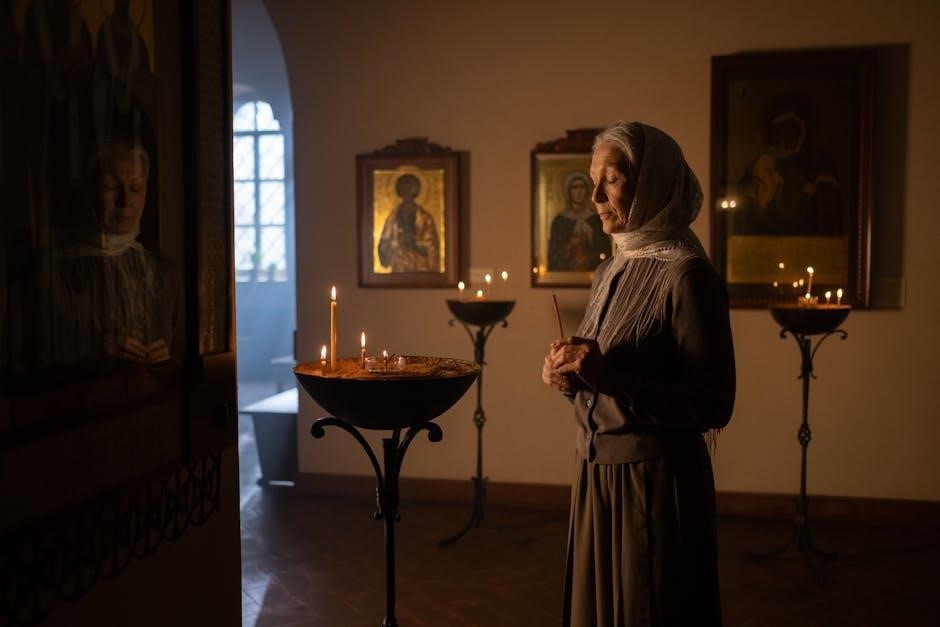
The Biblical Qualifications of Elders
Elders must be blameless, self-controlled, and above reproach, demonstrating wisdom and a good reputation. Their qualifications ensure they can lead and teach effectively, guiding the church faithfully.
Character Qualifications for Elders
Elders must be blameless, self-controlled, and above reproach, demonstrating integrity and a good reputation. They should exhibit humility, patience, and a genuine faith, living as examples to the congregation. Their character must reflect wisdom, hospitality, and a commitment to spiritual growth. These qualifications ensure elders can lead with moral authority, guiding the church in unity and holiness. A strong moral foundation is essential for shepherding God’s people effectively.
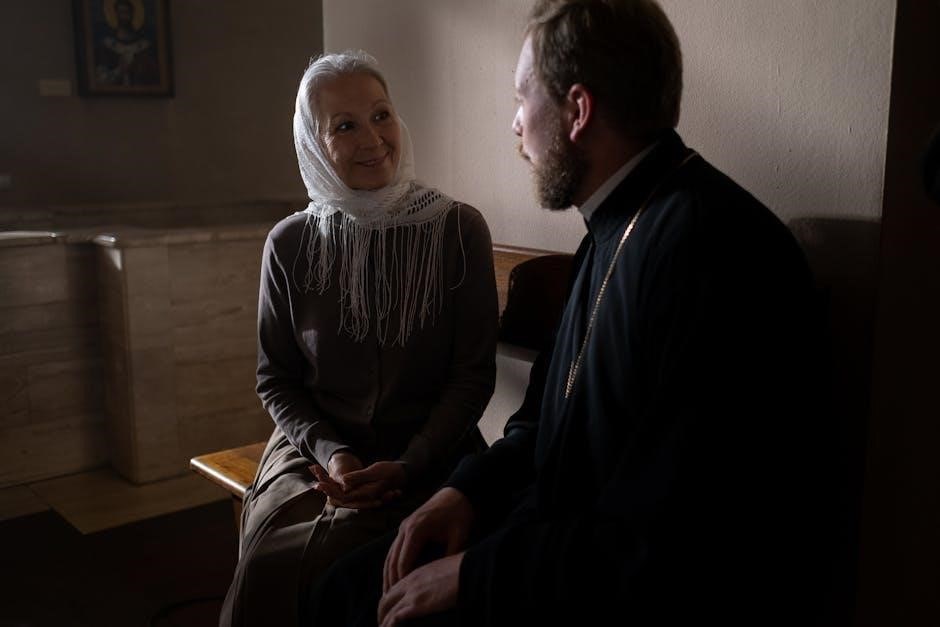
Reputation and Experience Requirements
Elders must have a reputable standing within the church and community, known for their integrity and wisdom. Experience in ministry and leadership is crucial, as they guide the congregation effectively. They should demonstrate maturity in faith and a proven ability to serve. Experience requirements ensure elders are equipped to handle the challenges of shepherding and teaching, fostering unity and accountability. Their reputation reflects their commitment to Christ and His Church, making them trusted leaders and examples to others.
The Role of Ability in Elder Qualifications
The role of ability in elder qualifications emphasizes the need for elders to possess spiritual and practical skills. Elders must be capable of teaching, leading, and shepherding the flock effectively. This includes the ability to preach, guide the congregation, and resolve conflicts biblically. Their ability should also extend to mentoring and discipling others, ensuring the church grows in maturity. Additionally, elders must demonstrate wisdom in decision-making and governance, as they oversee the church’s affairs. The Bible underscores the importance of elders being skilled in handling divine truths and equipping believers for ministry. Thus, their ability is not just theoretical but practical, enabling them to fulfill their duties as servant-leaders in the church. This ensures the church remains united and focused on its mission to glorify God.

The Role of Elders in Church Governance
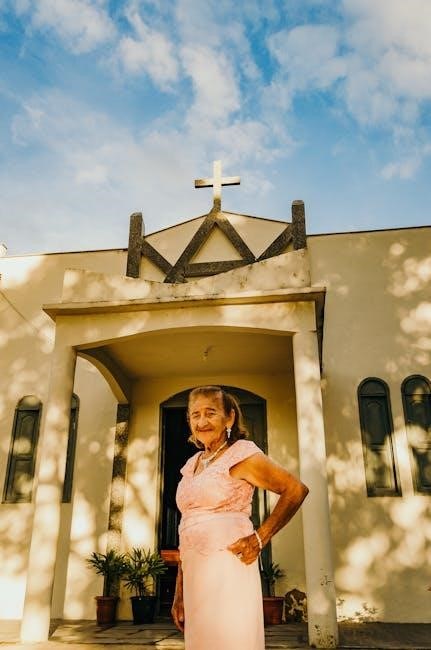
Elders serve as overseers, ensuring church unity and accountability. They focus on shepherding, teaching, and governance, working closely with deacons to build the body of Christ effectively.
Elders as Overseers and Shepherds
Elders serve as both overseers and shepherds, guiding the church with wisdom and care. They oversee the spiritual well-being of the congregation, ensuring biblical integrity and unity. As shepherds, they nurture believers, providing guidance and support to help them mature in faith. Elders are responsible for teaching, praying for the sick, and addressing spiritual needs, acting as God’s shepherds to His flock. This dual role requires elders to balance governance with compassionate care, fostering a healthy and thriving church community. Their oversight ensures all aspects of church life align with biblical principles, while their shepherding reflects Christ’s love and concern for His people. This unique blend of leadership and pastoral care is essential for the church’s growth and vitality.
The Distinction Between Elders and Deacons
Elders and deacons are distinct roles within the church, each serving unique purposes. Elders are responsible for spiritual oversight, teaching, and shepherding the congregation, ensuring biblical integrity and unity. They focus on the spiritual well-being of the church, providing guidance and care. Deacons, on the other hand, are primarily involved in practical service, addressing the physical and logistical needs of the church. While elders oversee the spiritual direction, deacons manage tasks such as benevolence, facilities, and administrative support. Both roles are essential for the church’s functioning, but they differ in focus and responsibility. Elders are seen as spiritual leaders, while deacons are servants who enable the church to operate effectively. This distinction ensures a balanced approach to church governance and ministry.
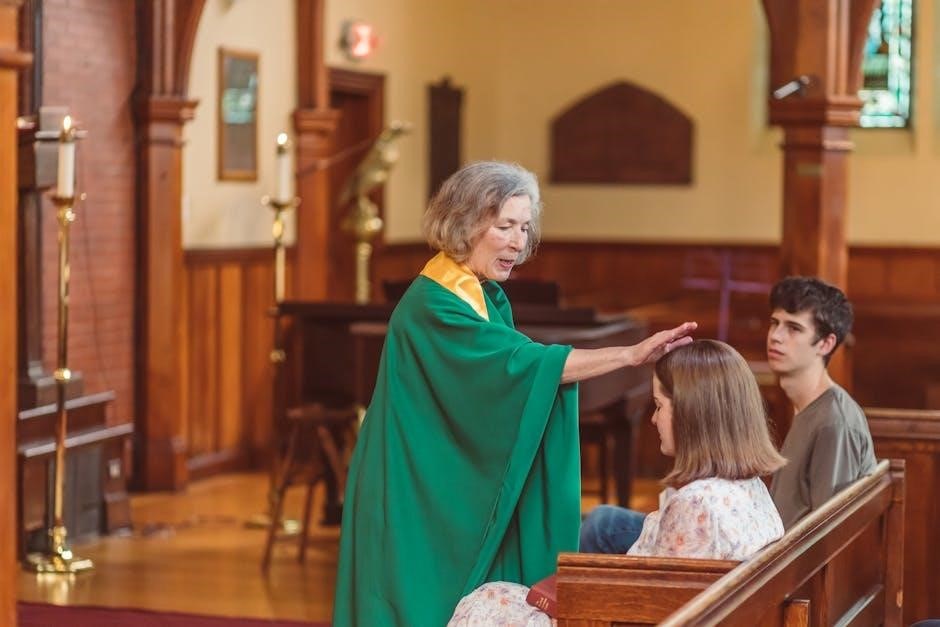
Elders’ Responsibility in Unity and Accountability
Elders play a vital role in maintaining unity within the church by fostering a cohesive spiritual community. They ensure members align with biblical teachings and shared values, resolving conflicts and guiding the congregation toward harmony. Additionally, elders are responsible for accountability, both within the leadership and among the members. They oversee disciplinary processes when necessary, ensuring adherence to biblical standards while offering grace and restoration. Elders must also hold themselves accountable, modeling Christ-like integrity and transparency. Their role in promoting unity and accountability ensures the church remains a place of spiritual growth, moral integrity, and collective purpose. By addressing divisions and upholding biblical principles, elders safeguard the church’s testimony and foster an environment of trust and fellowship.
Leadership Selection and Development
The selection and development of church elders involve a rigorous process of identifying biblically qualified candidates, providing comprehensive training, and equipping them for effective shepherding and teaching roles.
The Process of Selecting Elders
Selecting elders involves a thorough process ensuring candidates meet biblical qualifications. Churches often start with nominations from the congregation, followed by a council evaluation. Elders must not have their qualifications compromised; the man must fit the criteria. A declaration on the office and work of elders is typically read during elections, emphasizing their role as overseers and shepherds. Training is crucial, equipping elders to lead effectively. Some churches, like Gateway Church, have adopted structured approaches to ensure transparency and accountability. This process reflects the biblical mandate for godly leadership, ensuring elders are prepared to guide the church with integrity and wisdom.
Training and Equipping Elders for Ministry
Training and equipping elders is essential for effective ministry. Churches often provide structured programs, including biblical studies, leadership development, and practical ministry skills. Gateway Church, for example, emphasizes servant-leadership and accountability. Elders are encouraged to engage in inductive Bible study, prayer, and shepherding. Mentorship by experienced leaders helps new elders navigate challenges. Training also includes understanding church governance, financial stewardship, and conflict resolution. The goal is to equip elders to teach, shepherd, and unify the church. Regular retreats and workshops further enhance their abilities. Effective training ensures elders are prepared to address modern issues while remaining faithful to biblical principles, fostering a mature and unified congregation.
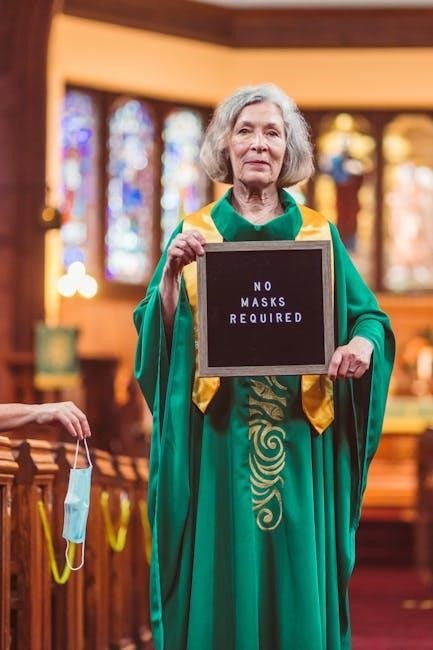
The Role of Elders in Discipleship and Mentorship
Elders play a vital role in discipleship and mentorship within the church. They are called to guide believers in spiritual growth, teaching them to observe Christ’s commands. By modeling godly character and imparting biblical wisdom, elders help individuals mature in faith. Mentorship involves nurturing future leaders, equipping them with skills for ministry and fostering a deep understanding of Scripture. Elders often work closely with younger or less experienced members, providing guidance and encouragement. This relational approach strengthens the church body and ensures the continuation of sound doctrine. Effective discipleship and mentorship by elders create a culture of accountability, love, and spiritual multiplication, which are essential for the church’s vitality and mission. Through these efforts, elders help build a community rooted in faith and committed to serving God and others.
The Biblical Mandate for Elders
The biblical mandate for elders is clearly established in Scripture, emphasizing their role as shepherds and overseers of God’s people (Acts 20:28, 1 Peter 5:2). Elders must meet specific qualifications and serve with integrity, ensuring the church remains faithful to Christ’s teachings and example.
Scriptural Foundations for Eldership
The scriptural foundations for eldership are rooted in the Bible, with clear instructions for church leadership. In 1 Timothy 3:1-7 and Titus 1:5-9, Paul outlines the qualifications for elders, emphasizing character, wisdom, and a blameless life. Elders are called to be shepherds of God’s people (1 Peter 5:2), overseeing the church with integrity and care. The New Testament church model, as seen in Acts 14:23 and 20:28, establishes elders as spiritual leaders responsible for teaching, guiding, and protecting the flock. Jesus Christ, the Chief Shepherd, serves as the ultimate example for elders to follow (1 Peter 5:4). These biblical teachings form the cornerstone of eldership, ensuring leaders are equipped to serve faithfully and effectively in their role. Scripture remains the primary source for understanding the divine mandate and responsibilities of church elders.
The Role of Elders in Teaching and Shepherding
Elders are called to serve as spiritual shepherds and teachers, guiding the congregation with wisdom and care. Their role involves expounding Scripture, providing doctrinal clarity, and equipping believers for maturity in Christ. As shepherds, they oversee the spiritual well-being of the church, ensuring members are nurtured and discipled. Elders must demonstrate a deep understanding of God’s Word, effectively communicating its truths to strengthen the flock. They also address moral and ethical dilemmas, offering guidance rooted in biblical principles. By modeling Christ-like leadership, elders foster a culture of unity, accountability, and spiritual growth within the church. Their teaching and shepherding ministries are vital for building a healthy, Christ-centered community, as emphasized in 1 Peter 5:2 and Acts 20:28.
Elders as Servant-Leaders in the Church
Elders embody the biblical model of servant-leadership, reflecting Christ’s humility and selflessness. They prioritize the needs of the congregation, demonstrating love, care, and compassion. As servants, elders lead by example, fostering a culture of unity and accountability. Their role involves prayerful intercession, wise counsel, and hands-on involvement in the church’s spiritual and practical needs. By serving with integrity, elders inspire others to embrace a servant-hearted mindset. This leadership style, rooted in Scripture, ensures the church remains a haven of grace and growth. Elders’ dedication to serving others underscores their commitment to Christ’s command to “feed His flock” and exemplifies the heart of true leadership in the body of Christ.

Challenges Facing Modern Church Elders
Modern church elders face significant challenges, including navigating cultural pressures, addressing complex moral issues, and maintaining accountability within the congregation to ensure unity and uphold biblical standards effectively.
Addressing Contemporary Issues in the Church
Modern church elders face the challenge of addressing contemporary issues while maintaining biblical integrity. Issues such as sexual abuse scandals, as seen in Gateway Church, require elders to conduct thorough investigations and ensure accountability. Cultural shifts, such as changing views on gender roles and sexuality, demand elders to balance tradition with compassionate engagement. Additionally, the rise of technology and social media presents new challenges for shepherding congregants and maintaining unity. Elders must navigate these complexities with wisdom, often collaborating with experts to address legal and ethical dilemmas. Their role as spiritual overseers necessitates proactive leadership, ensuring the church remains a beacon of hope and righteousness in a rapidly changing world. By seeking guidance from Scripture and the Holy Spirit, elders can effectively address modern challenges while upholding their biblical mandate.
The Struggle for Biblical Integrity in Leadership
Church elders face a significant challenge in maintaining biblical integrity in leadership amidst cultural pressures and internal conflicts. The qualifications for eldership, as outlined in Titus 1:6-9 and 1 Timothy 3:2-7, emphasize character, faithfulness, and a blameless reputation. However, modern trends often test these standards, leading to compromises that can undermine the church’s spiritual health. Elders must rigorously uphold these biblical criteria, ensuring that leadership remains grounded in God’s Word. The struggle for integrity is further complicated by the influence of secular values and the temptation to prioritize church growth over spiritual depth. Elders who remain steadfast in their commitment to Scripture provide a vital foundation for the church, safeguarding its mission and ensuring that leadership continues to reflect Christ’s servant-hearted example. This struggle is not new but remains central to the effectiveness of church leadership today.
Elders’ Role in Addressing Moral and Ethical Dilemmas
Elders play a critical role in guiding the church through moral and ethical challenges, ensuring decisions align with biblical principles. They must prayerfully discern issues, seeking God’s wisdom to address conflicts and sins within the congregation. Elders are responsible for maintaining unity and upholding Christ-like standards, as seen in Gateway Church’s approach to addressing past moral failures. Their leadership in such matters sets a spiritual tone, fostering a culture of accountability and integrity. Elders must also provide compassionate counsel, helping members navigate complex ethical situations while pointing them to Scripture for guidance. This role demands spiritual maturity, discernment, and a commitment to Christ-centered solutions, ensuring the church remains a beacon of moral clarity in an increasingly complicated world.
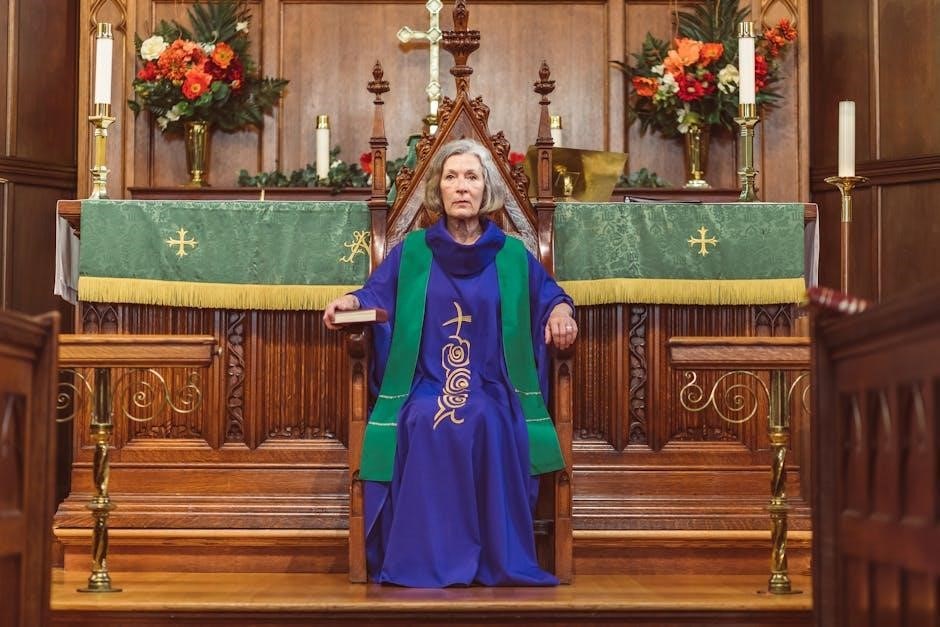
Case Studies and Examples
Gateway Church’s experience highlights the challenges of elder oversight, emphasizing accountability and biblical standards in addressing moral failures, providing valuable lessons for modern church leadership and integrity.
Gateway Church’s Approach to Eldership
Gateway Church’s approach to eldership emphasizes accountability and transparency, as evidenced by their recent leadership changes. Following allegations of mishandling a past child sex abuse claim, several elders stepped down, and new interim elders were appointed. This decision reflects a commitment to maintaining biblical standards and integrity in leadership. The church’s leadership structure includes executive elders who assist the lead pastor in managing church operations, such as budgets and staff oversight. Gateway’s experience underscores the importance of eldership in addressing moral and ethical dilemmas while ensuring the church’s spiritual health. Their approach serves as a modern example of how churches can navigate challenges while adhering to biblical principles of oversight and care for the congregation.
Lessons from Historical Church Elders
Historical church elders, such as Moses, Samuel, and the judges of Israel, provide timeless examples of shepherding God’s people. These leaders demonstrated the importance of integrity, prayer, and spiritual oversight, setting a high standard for modern elders. Their roles often involved resolving disputes, teaching God’s Word, and guiding the community with wisdom. The New Testament also highlights early church elders who prioritized biblical qualifications and active pastoring. These historical figures emphasize the need for elders to remain faithful stewards of God’s flock, balancing leadership with humility and compassion. Their legacy reminds contemporary elders to stay grounded in Scripture while addressing the unique challenges of their time.
Modern Churches’ Practices in Elder Selection
Modern churches emphasize transparency and accountability in elder selection, often involving thorough vetting processes. Background checks and community input are common practices to ensure candidates meet biblical standards. Training programs are frequently implemented to equip elders for their roles. Some churches adopt term limits to maintain fresh leadership perspectives. Collaborative decision-making between existing elders and congregants is encouraged to foster unity. The process typically includes public presentations of candidates, allowing the church body to provide feedback. This approach ensures that elders are not only qualified but also resonate with the congregation’s needs. By blending tradition with contemporary practices, modern churches aim to uphold the integrity and effectiveness of eldership while addressing current challenges.
Church elders play a vital role in spiritual guidance and oversight, ensuring biblical integrity. Their qualifications and servant-leadership are crucial for the church’s health and future direction.
Summarizing the Key Roles and Responsibilities of Elders
Elders are spiritual overseers and shepherds, entrusted with guiding the church according to biblical principles. Their primary responsibilities include teaching, praying, and setting a godly example. They must be blameless, able to teach, and manage their households well. Elders oversee church governance, resolve conflicts, and ensure unity among believers. They work closely with deacons to meet the church’s physical and spiritual needs; By focusing on spiritual health, elders help the church grow in maturity and faith. Their role is essential for maintaining biblical integrity and fostering a community centered on Christ. Through servant-leadership, elders model humility and devotion, inspiring others to follow God’s will.
The Future of Eldership in the Church
The future of eldership lies in maintaining biblical integrity while adapting to modern challenges. Churches must prioritize training and mentoring to equip elders for evolving societal demands. As seen in Gateway Church’s approach, incorporating new leaders while upholding qualifications ensures vibrancy. Elders will need to balance oversight with servant-leadership, fostering unity and addressing ethical dilemmas. By focusing on discipleship and collaborative governance, elders can guide the church toward spiritual maturity. The role of elders as shepherds and teachers remains vital, emphasizing the importance of character and ability. Through faithful stewardship, elders will continue to be instrumental in advancing God’s mission, ensuring the church remains a beacon of hope and truth in an ever-changing world;
Final Thoughts on the Importance of Elders
Elders are indispensable to the church’s spiritual health, providing leadership, guidance, and oversight; Their role as shepherds and teachers ensures the church remains grounded in biblical truth. By maintaining high moral and character standards, elders set an example for the congregation, fostering a culture of integrity and discipleship. Their ability to address modern challenges while upholding scriptural mandates is crucial for the church’s vitality. Elders’ collaborative leadership with deacons and other church members ensures unity and effective governance; Ultimately, their dedication to serving God and His people underscores their irreplaceable value in advancing the church’s mission. As the church navigates an ever-changing world, the elders’ steadfast commitment to biblical principles will continue to be a cornerstone of its success and growth.